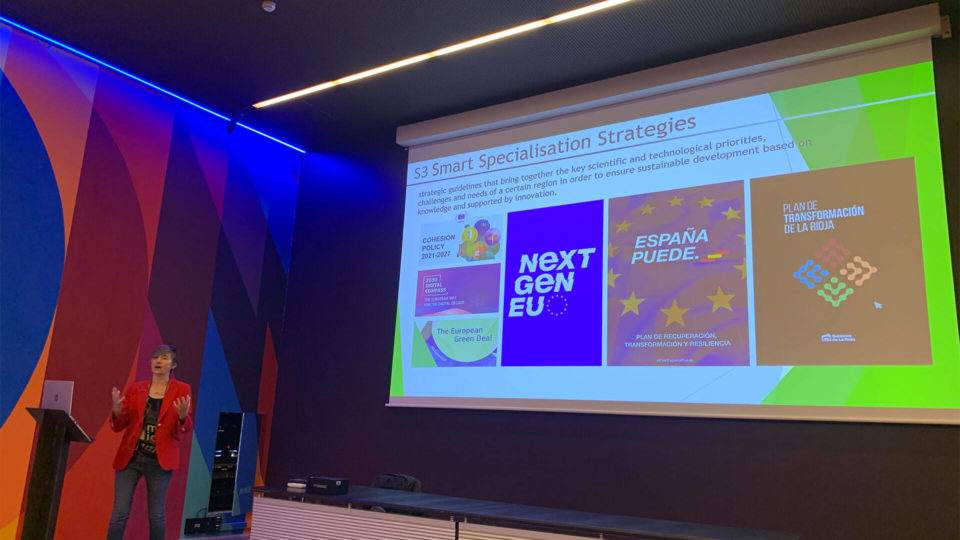
Digitalisation key to rural economies
La Rioja’s ‘innovative ecosystem’ supports digitalisation
La Rioja, 29 November 2022 – Earlier this month, partners of the Bio-Based Digital Twins project (BBTWINS) met in the renowned wine region of La Rioja for technical meetings on the development of a digital platform for two use cases in the agri-food industry. The project coordinator, La Rioja-based CTIC-CITA, along with select innovative SMEs, research institutes, and bioeconomy clusters – including three Spanish companies representing leading IT sectors – are working to produce a novel digital twin platform for two use cases – Portesa, an integrated pork producer in Spain, and Dimitra, a peach cooperative in Greece.
“Combining funding for innovation with local expertise is key to boosting economies and local employment.”
Nathalie Beaucourt, Representative, DG for Reindustrialisation, Innovation and Internationalisation, Government of La Rioja
Opening the final day of meetings, Ms. Beaucourt gave an overview of the region’s Smart Specialisation Strategy (S3). She stressed the importance of innovation funding for fostering and leveraging local talent that contributes to greater industry and EU-wide objectives such as the EU Green Deal and 2030 Digital Compass.
Integrating many cutting-edge technologies such as blockchain, artificial intelligence, big data, software analytics, computer simulation of agri-food processes, and the Internet of Things (IoT), BBTWINS is an example of the successful spearheading of innovation and digitalisation in rural areas. Despite being Spain’s smallest region, La Rioja is also its most innovative, with the regional government – an avid supporter of BBTWINS since its inception – making great efforts to digitalise the region.
Agriculture and food processing sectors are cost-driven – and as these sectors contribute largely to rural industry, the potential benefits of innovative digital twins to boosting rural economies is clear by making agri-food production more efficient, sustainable and competitive. This is reflected in projections showing that the intelligent agriculture market is expected to grow from EUR 1.4 billion in 2021 to EUR 2.5 billion in 2026.

Expected benefits of the BBTWINS technology include reduced raw material (food, supplies, feedstock etc.) and transportation costs up to 25%, while integrated traceability systems, based on blockchain, can inform consumers about the origin of products, improving food safety with smoother flows to processing plants and faster delivery times. The valorisation of wastes is also a key component of the project, with the validation of new products for the bio-based industry, such as nutraceutical products, fertilizers, and protein concentrates, providing new possible revenue streams for food producers.
According to a report released in October 2022 by the Bio-based Industries Consortium (BIC), the EU bioeconomy is stronger than ever, with a turnover of €2.4 trillion – the food and beverage sector accounting for half this total. However, with the value of the EU bioeconomy projected to reach €3 trillion by 2050 and three-quarters of the bioeconomy workforce employed by the agri-food sector, skillsets need to keep pace with the digital and green waves that will continue to shape the future of the EU to ensure these transitions are taken up at local-level, beckoning a new era of skills. The impact of the twin transitions on employment and skills needs are thus central issues. The EU’s green transition is estimated to lead to a net increase of up to 884,000 more jobs by 2030.
In October 2022, the European Commission announced 2023 as the European Year of Skills; while dissolving the skills gap is crucial to boosting innovation and competitiveness for the European economy, digital skills are urgently needed. An estimated 70% of businesses consider a lack of digitally skilled staff as an obstacle to investment, with nearly half of the EU population having little to no level of digital skills. In rural areas especially, where 30% of the EU population resides, digital skills lag 14 percentage points behind EU urbanites at 48% vs 62% respectively. This disparity shows the urgent need for local innovation strategies, such as La Rioja’s S3, to empower local actors to invest and leverage these changes. “Without local implementation, a true green and digital transformation simply is not possible,” Beaucourt concludes.
This press release is also available in Greek, Portuguese, and Spanish.

